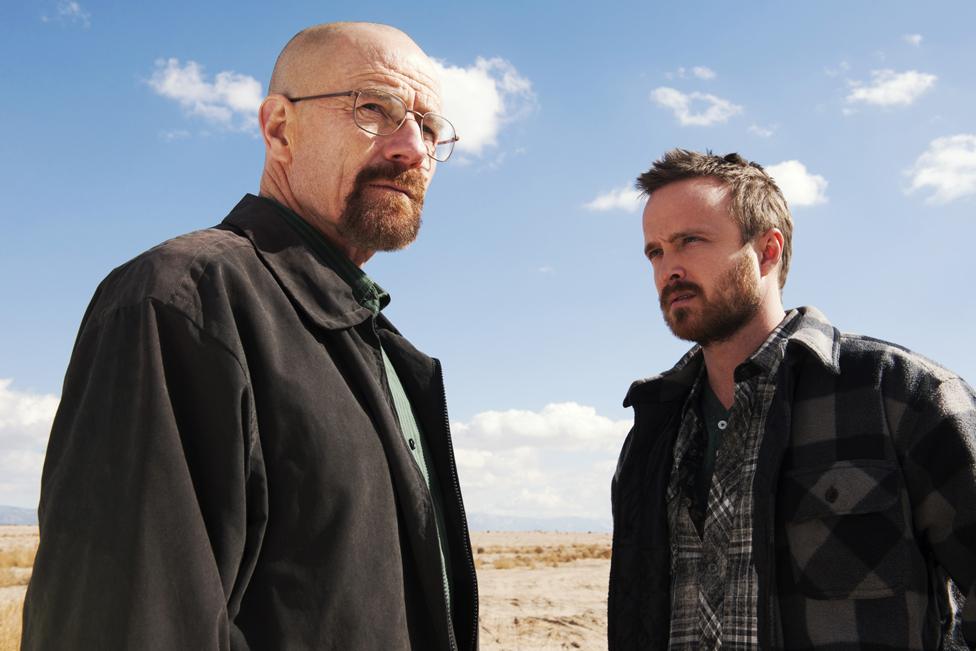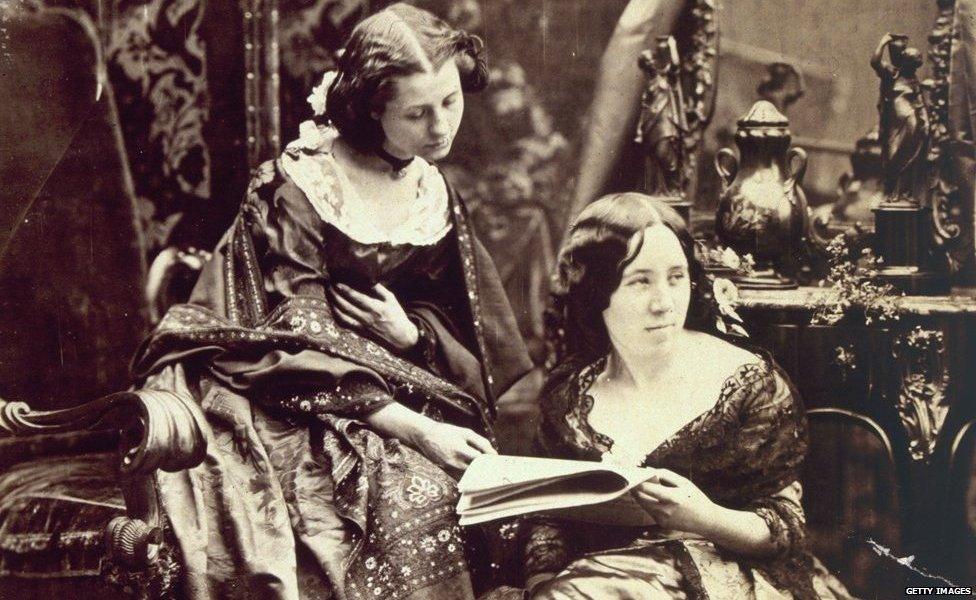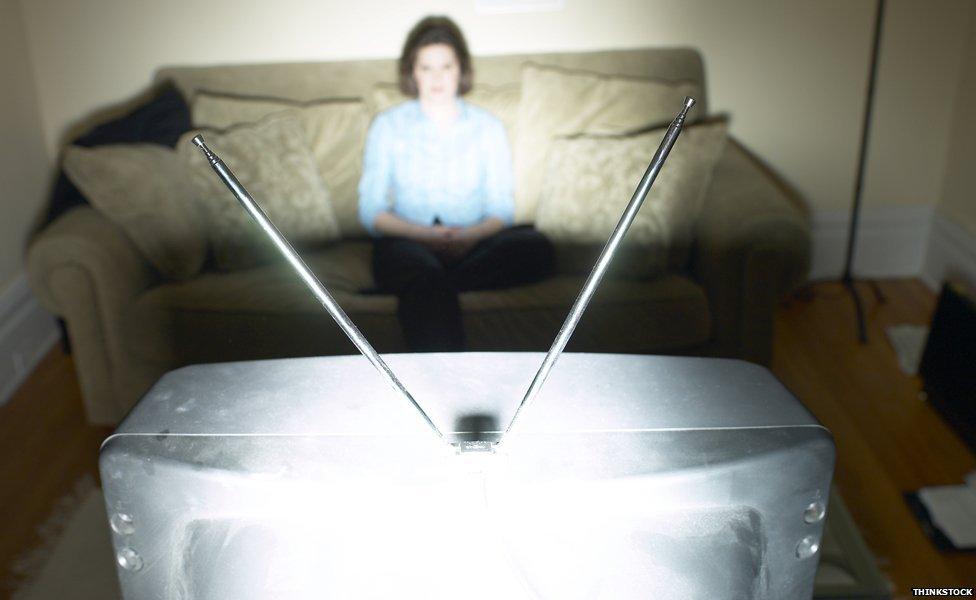A Point of View: How much longer can sprawling TV box sets get?
- Published

The current popularity of long-form television is at odds with modern society's notoriously short attention span. Is there a limit to viewers' patience, asks Adam Gopnik.
Lately, many people I know have been overtaken by a kind of paralytic illness - it involves hours spent in apathetic torpor, addicted to a mindless, slow-acting, and exhausting drug. There is no known cure, and, as addicts do, the addicted like to share details of their addiction, shrug off its bad effects and beg for more.
I am referring, of course, to the plague of the long-form television series in its deadly DVD form - which you can also catch in the form of on-demand video, if your kid has the right wi-fi equipment in his or her video game console.
The hollow eyes and the exhausted looks - not to mention the insanely tedious conversations - that you hear rise over dinner parties and on commuter trains, all result from binge-watching Breaking Bad and Game of Thrones and Mad Men and the rest. Hour after hour is spent following the intricate stories and - in the case of Game of Thrones at least - completely inexplicable plot twists and bottomless interchangeable dramatis personae of each series.
The business of choosing a long-form television series to become addicted to is eerily like the act of marriage itself. One or two episodes are, so to speak, dated. They please. They intrigue. But then, as with marriage, a commitment must be made. If you decide to watch Homeland or Downton Abbey, you do not really have the option of watching an episode here or there anymore than you can be married for an afternoon.
You are committed to a programme, to "seasons", sometimes six or seven seasons. This means hours - hours and hours and hours - of committed viewing.
You debate it with your spouse, your friends. "We're thinking of starting House of Cards," you say nervously. "You mean the original British one or the American one?", they reply anxiously, in the tone of specialists diagnosing a disease. "The British one," you say, and you try to read their ambiguous expressions. As with doctors, do they know something they won't tell us? Soon, everything else in your life - theatre-going, museum visits, eating, breathing - has vanished in your commitment to seven more hours of following the ins and outs of petty crime in Baltimore or the adulterous lives of slow-emoting ad men in 60s New York.

House of Cards - the American one
Now, of course, at one level, this is something to celebrate. These series are - well, I except Game of Thrones - actually good. The miracle in which a true pop-culture form intersects, however briefly, with real art - intersects with accomplishments of subtlety and depth and meaning - is so rare that we should sing hosannas any time it takes place. It happened with, oh, drama in 17th Century London, and opera in 18th Century Italy, with the novel in 19th Century Europe, and with Hollywood movies in the 1970s. Great work was done and was available to all. And, since we know from history that such golden moments are astonishingly brief - there was a new, great verse tragedy on stage in London almost every afternoon in 1600, and since then, nothing - we should cherish these moments. We are in the midst of one, and, I know, we should not complain.
But we can analyse. For there is that additional oddity about this moment and that is, the appeal of sheer length. We live after all, in a culture which is famously short of attention span, supposedly quickly amnesiac - a culture so impatient that teenagers no longer have time to talk to each other on the telephone for three minutes, but must text each other in cryptic shorthand, while simultaneously texting some three other teenagers, a practice that, by now, has passed to their parents. Political speeches have been reduced to talking points, journalism to money quotes, long-form reporting to mere takeaways.
And yet this same culture now has an appetite for slowly wrung-out storytelling that would have shamed the Greeks as they listened to a bard recite in monotone the ancient epics of their race - or for that matter, would have shamed the Elizabethans, watching the original Hamlet wend its way through a mere five or so hours. By comparison with Breaking Bad, Hamlet at full length is positively epigrammatic. Even the Victorians, with their multi-volume novels, are usually portrayed reading them bit-by-bit in bed, over six months or so. I don't recall binge reading of Middlemarch or Our Mutual Friend consuming many hours of the Victorian evening. They snatched at their stories, as we once did at ours.
I have a theory, therefore, which I shall now present to you - you can call it Gopnik's law of the Conservation of Cultural Capital. In any cultural period, I believe, a steady, similar amount of information, emotion, narrative - of art and news and entertainment - is being dispersed throughout the society. But there are invisible laws of compensation at work to be sure that a fixed capital sum of these things remains in place.

Victorian women have to wait until next week to find out what happened
If the prose of public life is eloquent enough to demand our attention - as it was, say, in the Augustan 18th Century, when Burke's speeches could go on for days and even wretched condemned men were expected to orate before they died - then the literature of the period will be relatively aphoristic and condensed, offering neat verse couplets and short, mordant allegories. And, from Pope's rhymed poems to Voltaire's Candide, that's what the popular literature of the Enlightenment was indeed like. The letters, the poems, the public life of the time are all equally aphoristic, sharing this fixed sum of narrative capital. Ben Franklin's memoirs are concise because the Declaration of Independence was well worth reading.
If, on the other hand, public life is especially tedious or unduly pious or so rife with obvious hypocrisy as to be almost unendurable - as it was with the Victorians, and is with us - then the forms of popular entertainment and art will be spacious and long-winded. They will, so to speak, take up the slack, inject the truth of human nature into our lives where it's missing. Or, if we live musically with three- and four-minute popular songs, as we mostly have done in the past 50 or so years, then when serious opera does appear, as with the work of John Addams and the like, to get from act one to act two will take what feels like several days (yes, there are many exceptions to this rule. Write to the BBC, not me).
And so in this YouTube and Twitter time, the compensatory law of cultural conservation insists that our larger forms will be… large. Really large. Ten hours, 20 hours - stretching out over seasons and years and compelling their admirers to sit, helpless and enslaved, in front of their televisions. If we did have time to telephone, if we thought that texting was shameful, we would have no time for The Wire. Eliminating one forces equilibrium in the other.

It can pay to be brief
The frightening, or seductive, future that this law entails is also obvious. As communication, public and political and spiritual, becomes ever more condensed - as newspapers close and are replaced exclusively with Instagram feeds, as texting becomes ever more enciphered and as the demotic slang of teens, which we will all speak sooner or later, becomes ever more abbreviated then we can expect, or dread, ever longer compensatory popular narratives.
The next great HBO or BBC series will take not hours but days, then weeks - until at last we shall, doubtless, arrive at the nirvana of narrative - the moment when the programmes we watch take exactly as long as the lives we lead, with each episode of the story consuming 24 hours of our existence, with the circuit between life and art finally complete, and no time in our lives to do anything at all but hold our devices on our laps to tweet and text, while our eyes remain fixed relentlessly on the programmes that engross us. That final series may be called The Singularity, or merely Life: A Nostalgic Salute.
I am getting ready for the day.

More from the Magazine

Slow-tempo TV is hardly new. Series like the 26-part Forsyte Saga and the TV version of Tinker Tailor Soldier Spy unfolded gradually. Granada Television's classic 1980s dramas Brideshead Revisited and The Jewel in the Crown spread out over 11 and 13 hours respectively.
And two decades ago international audiences embraced Twin Peaks in huge numbers despite its lack of urgency in revealing Laura Palmer's murderer.
But what distinguishes the current incarnation of slow TV is that it flies in the face of conventional wisdom about modern audiences demanding immediacy, their attention spans sapped by the ever-moving online era.
Is slow TV taking over the airwaves?
A Point of View is broadcast on Fridays on Radio 4 at 20:50 BST and repeated Sundays 08:50 BST
Subscribe to the BBC News Magazine's email newsletter to get articles sent to your inbox.